Last week, Joanna Maitland in Libertà Books gave us a most interesting blog on boys’ behaviour in Georgette Heyer’s novels and argued that the way they behaved did not always – to her mind – match their ages.
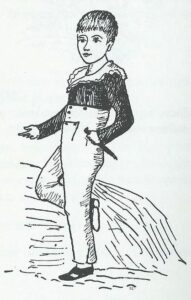
Young boy in a skeleton suit. 1800 (Charles Dickens was forced to wear such a suit and hated it!) It can’t have been easy to put on, either.
For example, Edmund in Sylvester is supposed to be six, but he can’t even dress himself. When he runs to Sylvester, he hugs his uncle’s legs before being tossed into the air. I have to say that I agree with Joanna here; the way he talks and behaves is too babyish for a six-year-old. “I want to go home!” announced Edmund fretfully. “I want my Button! I’m not happy!” (Button is the name of his nurse.)
Edmund’s behaviour and use of language makes him sound more like a four-year-old than a six-year-old, and surely a six-year-old would be tall enough to hug a bit higher!
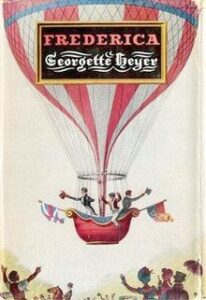
The cover for Frederica by Barbosa is based on a print of James Sadler’s ascent at Oxford in 1810
Then we have Felix, a 12-year-old schoolboy in Frederica, who is passionately interested in steam-power – and air balloons. Joanna suggests that his obsession with steam power is more of typical of an 8-year-old. I cannot agree with her here. I’m thinking of people like Gerald Durrell, whose passion for animals started very young – and continued for the rest of his life. Many children know what they want to do when they grow up – I certainly did. Personally, I find Felix’s childhood enthusiasms very believable.
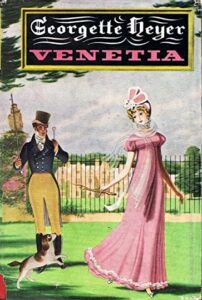
Cover for ‘Venetia’
Aubrey, in Venetia, is the heroine’s brother and just 17 when the story begins. He was born with a diseased hip joint; as Venetia explains, ‘It is better now but suffered a great deal when he was younger, and he will always limp.’ Aubrey has grown up to be ‘a brilliant scholar’ , entirely wrapped up in the Classics. He aims to go to Oxford University where, we assume, he will eventually get a Fellowship. Aubrey will be just seventeen when he goes to Oxford, but that was not unusual at the time.
Aubrey resents Mrs Scorrier’s rudeness to his sister and sets out to beat her at her own game. He is much cleverer than she is, and has a better way with words. They end up being at daggers drawn – but that makes life very uncomfortable for Venetia.
Joanna’s query about Aubrey is that he calls Venetia ‘m’dear.’ It seems an extraordinarily old-fashioned way to address her. So why does he do it? Is he actually 17 going on 60? I’ll return to this later.
This is where I’m going to change tack for a moment, and talk a bit about my own childhood and the idiosyncrasies of being brought up by nannies and nursery maids, because, as I was absorbed in Joanna’s blog, I could see a number of echoes of what happened to myself and my three brothers when we were children with Georgette Heyer’s boys’ behaviour. And they, of course, would have been brought up in a very similar way to my own upbringing.
Let me start with a typical day. The nursery wing in my family home comprised a day nursery, a night nursery, Nanny’s bedroom, a bathroom and a separate lavatory, connected by various small landings and staircases. There were four of us children (me and my three brothers) and, when I was small, we all slept in the night nursery, with the nursery-maid who had a curtain screen round her bed to give her some privacy. (My brothers enjoyed suddenly flinging back her curtains. No wonder we went through so many nursery-maids.) My youngest brother slept in a cot in Nanny’s bedroom until he was old enough to join the rest of us in the Night Nursery.
During the day, we were either outdoors, or playing in the day nursery. It was a big room with enough space for a large table – we all ate up here – (we didn’t eat in the adult dining-room with our parents until we were 12.) The day nursery had a floor to ceiling linen cupboard along one wall; two large windows with window seats; a door leading out onto a landing which connected with a stair-case going up to the servants quarters, to the left was the linen room and other bedrooms, and you went downstairs to the adult part of the house.
There were armchairs you could upend to crawl under, or they could form a castle which we could stand and fight on; a chest of drawers for toys, dining chairs, a high chair, and a red patterned carpet with what looked like blue railways lines round the edge for toy trains. We had lots of building bricks – there had been several generations of children in the house, a rocking horse, and, naturally, bookcases.
At five o’clock, we were tidied up and taken downstairs by Nanny to the morning room and an hour with Mother. The butler would knock on the door and say, ‘The children, Madam,’ and we were ushered in – on our best behaviour. At six o’clock Nanny would come down to collect us and we would kiss our mother goodnight and go upstairs to bed.
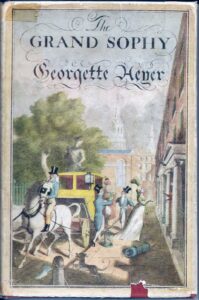
The cover for ‘The Grand Sophy’
What struck me very forcibly when thinking about the various groups of children in Georgette Heyer’s novels, is that those in the nursery formed a sort of clique – as we did. Take the eight Rivenhall children in The Grand Sophy. We gradually discover various alliances amongst them: Hubert is very attached to his sister, Cecilia; he resents the prudish Eugenia Wraxham’s disapproval of his sister – so he locks Eugenia in a bluebell wood with a young man – to mortify her (ladies should not be locked in woods with young men). Charles, the eldest brother, has a special nursery name for Cecilia: Cilly, which he still occasionally uses affectionately. All of the Rivenhall children still in the nursery enjoy poking fun at the prosy Lord Bromford. And we note how upset Charles is to learn that his younger brother, Hubert, was too afraid to confide in him about his debts.
In other words, bonds forged in childhood are not easily broken.
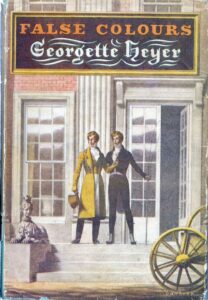
Barbosa’s cover for ‘False Colours’
I think that the children in Heyer’s novels have more instinctive loyalty to their sibs and Nurses than they do to their parents – as I did. In False Colours both Fancot brothers love their mother rather more than she deserves but, we note that, when Evelyn comes home after his accident, the first person he goes to is Pinny, his old nurse, rather than his mother. He knows that Pinny won’t betray him.
So, returning to Edmund in Sylvester; Edmund doesn’t have any sibs but he is devoted to his nurse, Button; in fact she’s far more of a mother to him than the spoilt Lady Ianthe. But Button has her own future to think about. Perhaps, keeping Edmund a bit of a baby by not teaching him how to dress himself, reassures her that she won’t be out of a job. It can’t have been easy for a woman in her position to think about what the future held for her; the quicker Edmund grew up, the sooner she’d be looking for another job.
In Frederica, Harry shows himself to be 100% on his sister Charis’s side; he will go to great lengths to facilitate her marriage to her cousin Endymion. And his stratagem succeeds – though not quite in the way he expected.
And, with regard to Aubrey calling Venetia ‘m’dear’, when my sibs and I were young, we would talk to each other using thee’s and thou’s and the old third person singular ending, ‘eth’. For example: ‘Dost thou want to come blackberrying?’ ‘No, it raineth.’ I can’t remember how it started, but I do remember that, later on, it made Shakespeare a lot easier at school!
To sum up, I suggest that the various boys (or girls) in Georgette Heyer’s novels who behave either older or younger than their real ages are doing so for a good reason – and that reason is to do with resentment at the way that one of their sibs is being treated and also, perhaps, to reinforce the bonds between them.
Link to Joanna’s blog:
Elizabeth Hawksley
I am delighted that my ‘Tempting Fortune‘ is now out in e-books.
https://www.amazon.co.uk/Tempting-Fortune-Elizabeth-Hawksley-ebook/dp/B091P5KYHQ/
Please share this page...
How fascinating. I completely understand the alliance between children in the regime you describe, Elizabeth. What is interesting is that Georgette Heyer might do so, since her upbringing in prosperous but definitely middle class wouldn’t have run to the sort of child-establishment that your describe.
And Nurse is quite a feature of Venetia, if I remember aright. Wasn’t she the one that said Damerel would be nibbled to death by ducks? And, having had the same sort of upbringing, he realised she was a power in the land and respectfully called her Mrs Priddy. Conway was certainly counting on her to defeat his awful mother-in-law in the matter of caring for his young pregnant wife and eventual offspring.
Thank you for your comment, Sophie. I don’t know about being nibbled to death by ducks, but I do know that Nurse thought that Damerel would be eaten by frogs! I think you’re right about Conway, I’m sure he was counting on Nurse to look after Charlotte during her pregnancy.
Re: children’s thoughts on adulthood. I think the truth is that children always know that the adult world isn’t as well-behaved as mothers like to pretend it is. If it was a choice between what my mother said and what cook and others ‘downstairs’ hinted, I always believed Cook – who wasn’t afraid of speaking uncomfortable truths.
Good points. I am fascinated by your upbringing in the nursery environment. We had nannies too in Africa, but we still spent a lot of time with our parents. Both of them were pretty hands on in different ways, even though they didn’t have to do the babysitting in the main, which left my mother free to engage in all kinds of interests while my father was at work.
What you’ve made me wonder is whether the nursery environment is also responsible for children in Heyer behaving younger than their years. It’s a point you make about Edmund’s nurse, but I’m thinking that if you don’t spend much time with adults, perhaps you mature more slowly. No reflection on you and perhaps you can enlarge on that.
I certainly don’t think children of the Georgian and Regency era were nearly as sophisticated as the children of our era now. They were dressed as mini adults, but I’m pretty sure they didn’t behave that way except when in the presence of adults.
Thank you for your perceptive point, Elizabeth. I agree with you. I think the Nursery environment acts in a way to create a view of the world which all the children can agree on. It’s true that we were innocent in many ways, BUT the downstairs world which included cook, butler, various maids, gardener and groom, a number of whom were quite capable of not mincing their words about what went on ‘upstairs’. I probably wasn’t meant to overhear what they said, but a small child can listen and move quietly when they need to.
I’m sure that we were less worldly-wise than children are now, but I always knew that there were at different ways of looking at the world: men’s; women’s; children’s, and a load of upper class assumptions which I simply did not believe. And having good manners drummed into us from an early age by our mother, meant that, as we grew up, we could ‘fit in’, at least on the surface.
Fascinating reading. Thanks for posting this.
Thank you for reading it, Gordon! It’s largely a vanished world – but, of course, it can be helpful if you are an historical novelist because you understand the code of manners and how it works, from the inside.
A fascinating blog, Elizabeth, and some points which bear thinking about. In my defence, it wasn’t Felix’s obsession with steam and engineering that made me think he was younger than 12, it was his wheedling ways when he wanted something. But every reader will read these characters in their own way. And quite right too!
Thank you for your comment, Joanna. Ah, yes, the wheedling – you are quite right. It’s interesting how the boys’ characters come out more strongly than the younger girls’ in Heyer. Maybe it’s because the girls, like the obnoxiously saintly Eliza in ‘Sylvester’ occupy much less space.
Thank you for your post, and for sharing your own memories, Elizabeth. It’s fascinating to have so much insider information on what life for children was like in an upper class home run according to tradition. I’ve never had any problem accepting the attitudes and roles of children in Georgette Heyer’s novels.
Children spoiled by Nurse [or more currently grandparents], do allow themselves to be petted and waited on, and even spoonfed at table ‘in case they try to leave their greens, etc.’
Georgette wrote what she knew of such systems.
As an aside, I do wonder who some of her dowagers were based on, and whether they were recognisable to her readers.
Thank you for your interesting comment, Beth, particularly about the dowagers! I found myself thinking that Georgette Heyer herself was seen by many as a formidable lady – somebody one would not want to cross – and perhaps something of a Dowager herself! I put up a blog called ‘Jane Austen: The Power of Money’ which concerns a number of rich, older women, like Mrs Churchill in ‘Emma’ and the manipulative Mrs Ferrars in ‘Sense and Sensibility’ who hold the purse strings and don’t hesitate to tell their dependents who to marry – or try to.
I don’t know what you think, but I would argue that Lady Stoborough, Damerel’s great-aunt, could easily be a Mrs Ferrars herself!
Jane Austen did a nice line in disagreeable older ladies, such as Aunt Norris, Mrs Churchill and the atrocious Mrs Ferrars. I can only tolerate her because she gets her come-uppance at the end, along with her ghastly daughter.
To me, Lady Stoborough doesn’t seem to fit in that category, as she has a more positive ambition. She’s trying to rehabilitate her rake of a nephew and is willing to leave him her fortune. Her choice of bride for him could well be due to a longterm friendship with the girl’s family. She has become an overbearing old lady but the idea of crossing swords with her gives Mr Hendred a bit of a thrill. I suspect they have had some connection in their past, decorous as both may now have become.
Interesting, Beth. What worries me about Aunt Stoborough is that she is, surely, a very controlling woman. First, she wants Damerel and his cousin Alfred to parade before her so that she can decide which one she wants to leave her fortune to, and then she wants to choose Damerel’s wife for him. However, I’m sure that Mr Hendred is quite capable of doing a bit of manipulation in his turn …. I’d love to be a fly on the wall when that happens!
Thank you for those very interesting and useful insights, Elizabeth.
One thing I think Joanna overlooked in her discussion of Aubrey was the maturing effect of suffering. Aubrey had clearly endured intense and prolonged pain as a child, and still was often if not always in pain. In addition he had surely felt it when people were repulsed by his disability, and he had learned to judge people by that yardstick. He had also spent time isolated, thinking and reading at an age when other children would have been carefree and playing. All of these things would have aged him, I would say, and given him a much more mature outlook than most boys his age. I think that was what Heyer was consciously trying to present.
As Jane Austen says of Tom Bertram, in explaining his maturing out of the bone selfishness of his youth, “He had suffered, and he had learned to think.” I would say that Aubrey acts older than his years because he IS older than his years. Much older.
Hello, Alexandra, how nice to hear from you again. I think you are absolutely right. I should have thought of that. It’s true that Aubrey is perhaps too wrapped up in his Greek Classics, but, actually, I think he’s chosen his mentors well. Euripides’s works (I’m a Euripides fan) show him to have been a dramatist of great insight and humanity. Sophocles, too. I hadn’t appreciated this before; I’d allowed myself to stay with the humour when I should have thought more deeply about what Aubrey was actually reading.
Thank you.
Fascinating to read your post, Elizabeth, especially as I have just read Joanna’s follow up post on Brothers. Food for thought, as I’ve said before.
Thank you for your comment, Lesley. I’m just about to add a comment on Joanna’s new post myself!